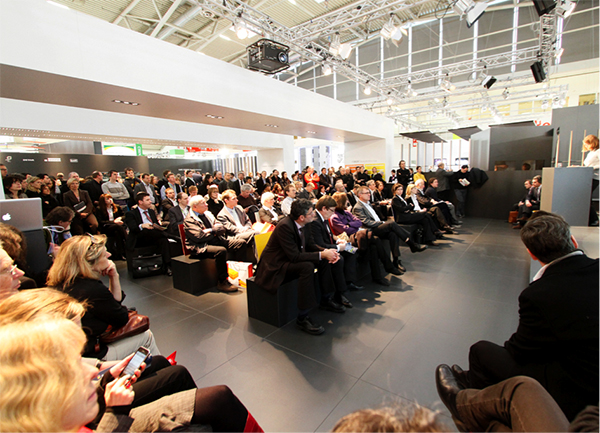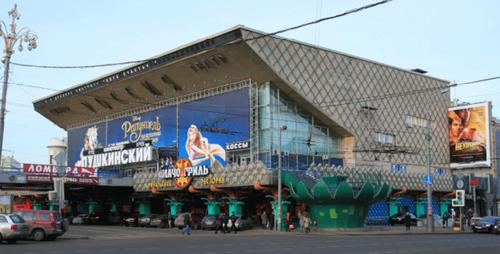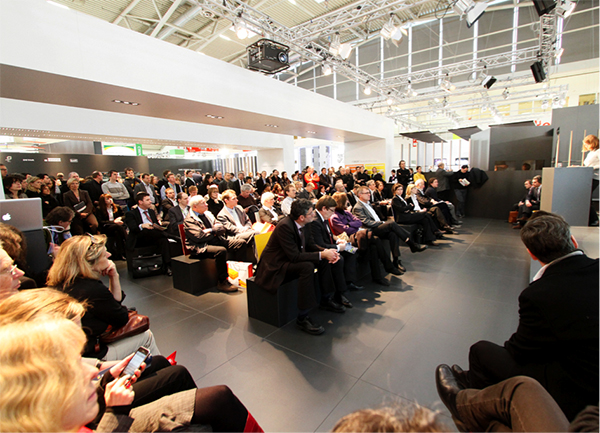Topics for BAU 2015: DETAIL research FORUM Building the Future

The time of utopias, urban visions and futuristic scenarios is over. Architectural, urban planning and building research will meet future challenges with concrete recommendations for action and solution-oriented approaches. DETAIL research's "Building the Future" forum will during BAU 2015, the world's leading trade fair for architecture, materials and systems, provide an insight into practical international research projects focusing on future construction.
Date: January 19-24, 2015, 2:30 pm - 5:00 pm
Ort: Exhibition ground Messe München, Hall A4/338
Ort: Exhibition ground Messe München, Hall A4/338
The building of the future will be characterized on the one hand by globalization and the densification of urban areas, and by peripheralisation, regionalism, gentrification, demographic change, resource scarcity and climate change on the other. Architecture, research, industry and politics address these complex structural change processes with interdisciplinary cooperation and cross-sectoral solution approaches. Renowned speakers will provide insights into their research activities: How can urban planners and architects create a basis for steadily growing urban social systems? What happens with rural regions if their inhabitants continue to migrate to the cities? How can we continue to build in a resource-friendly manner and feed demolition products back into the material cycle? How will serial production affect our built environment? And what influence do we as users have on the architecture of the future?
Daily topics including content explanations:
BAU 2015 / January 19 to 24 / DETAIL FORUM - Building the Future Monday, January 19, 2015
Urban Sustainability Life in the future will take place in cities. Global population trends prove this. Green City, Smart City, Megacity, Eco-City, City of Tomorrow - there are currently a great many concepts for the city of the future. Urbanization seems to be the only workable solution to the problem of a growing global population. This makes the system and structure of a city a field of research for all disciplines. Urban planning and architecture must provide the basis for the functioning social systems of the future.
BAU 2015 / January 19 to 24 / DETAIL FORUM - Building the Future Monday, January 19, 2015
Urban Sustainability Life in the future will take place in cities. Global population trends prove this. Green City, Smart City, Megacity, Eco-City, City of Tomorrow - there are currently a great many concepts for the city of the future. Urbanization seems to be the only workable solution to the problem of a growing global population. This makes the system and structure of a city a field of research for all disciplines. Urban planning and architecture must provide the basis for the functioning social systems of the future.
- 2:30 pm: Utopias and Urban Development?
Prof. Dr. Gerald Wood, Urban and Regional Studies, University of Münster - 3:00 pm: Morgenstadt – Co-Evolution of Urban Systems
Dr. Alexander Rieck, Head of Corporate Projects, Fraunhofer-Institut für Arbeitswirtschaft und Organisation IAO, Stuttgart - 3:30 pm: Densification
Justus Pysall, Pysall Architekten, Berlin - 4:00 pm: Activating Urban Wastelands
Jana Reichenbach-Behnisch, rb Architekten, Leipzig - 4:30 pm: New Mobility
Selva Gürdo?an, Gregers Tang Thomsen, Superpool, Istanbul
Tuesday, January 20, 2015
Globalization versus regionalism / Beyond globalization Globalization currently finds itself confronted with strengthened regionalism. Booming cities are leading to shrinking regions. As cities grows, the importance of rural areas is also increasing. Just as the metropolises are redefining themselves, a restructuring of suburban areas is also taking place. In the context of these glocalization shifts, experts speak of the compression of intermediate cities and even of possible new cities being established.
Globalization versus regionalism / Beyond globalization Globalization currently finds itself confronted with strengthened regionalism. Booming cities are leading to shrinking regions. As cities grows, the importance of rural areas is also increasing. Just as the metropolises are redefining themselves, a restructuring of suburban areas is also taking place. In the context of these glocalization shifts, experts speak of the compression of intermediate cities and even of possible new cities being established.
- 2:30 pm: The City and the Region
Prof. Dr. Frank Eckardt, Urban studies and social research, Bauhaus University Weimar - 3:00 pm: Disconnected? Peripheralization of Cities and Regions
Dr. Manfred Kühn, Leibniz Institute for Regional Development and Structural Planning, Erkner - 3:30 pm: Spatial Pioneers in Rural Regions
Kerstin Faber, Projektbüro Franz Faber, Leipzig - 4:00 pm: Smart communities in times of demographic change
Thomas Bade, iF UNIVERSAL DESIGN + SERVICE GmbH, Munich
Wednesday, January 21, 2015
Lasting Building Quality The treatment of existing buildings against the background of demographic change and population decline is increasing in importance. Renovation saves both energy and costs in the long term. Maintenance increases the comfort of users. Redensification harnesses urban potential and the upgrading of existing properties enhances the entire urban environment.
Lasting Building Quality The treatment of existing buildings against the background of demographic change and population decline is increasing in importance. Renovation saves both energy and costs in the long term. Maintenance increases the comfort of users. Redensification harnesses urban potential and the upgrading of existing properties enhances the entire urban environment.
- 2:30 pm: Lasting Building Quality
Dr. Robert Kaltenbrunner, Head of Dept. of Building and Housing, Federal Institute for Research on Building, Urban Affairs and Spatial Development, Bonn - 3:00 pm: Resource Architecture
Prof. Arno Brandlhuber, Architecture and Urban Research, Academy of Fine Arts in Nuremberg, brandlhuber+ architekten und stadtplaner, Berlin - 3:30 pm: Quality of Life through Refurbishment
Ralf Werry, Competence Center Housing & Modernization, Luwoge GmbH, Ludwigshafen
Dr. Marc Fricke, Project Manager SLENTITE, BASF Polyurethanes GmbH, Lemfoerde - 4:10 pm: Active Building – Reconstruction as a Plus Energy House
Prof. Dipl.-Ing. Joost Hartwig, LCA, sustainability assessment and energy efficiency in building unit, Frankfurt University of Applied Sciences, ina Planungsgesellschaft mbH, Darmstadt
Ruben Lang, o5 Architekten bda raab hafke lang, Frankfurt am Main
Thursday, January 22, 2015
Climatic Strategies Climate change will become perceptible in the next 30 years. Scenarios predict significantly more summer days with higher temperatures and milder winters. This will be felt particularly strongly in urban areas. Various research projects are already focusing more strongly on the preparations for climatic change. The development of climate adaptation programs and the testing of model regions is already in full swing, and future construction is arming itself for climate change.
Climatic Strategies Climate change will become perceptible in the next 30 years. Scenarios predict significantly more summer days with higher temperatures and milder winters. This will be felt particularly strongly in urban areas. Various research projects are already focusing more strongly on the preparations for climatic change. The development of climate adaptation programs and the testing of model regions is already in full swing, and future construction is arming itself for climate change.
- 2:30 pm: Buildings and Climate Change: The Plus Energy House
Hans-Dieter Hegner, Federal Ministry for the Environment, Nature Conservation, Building and Nuclear Safety, Head of Division Civil engineering, sustainable building, research in the building sector, Berlin - 3:00 pm: building CULTURE vs. climate/energy CHANGE – the durability of our acting
Prof. Dr.-Ing. Lamia Messari-Becker, Lehrstuhl für Gebäudetechnologie und Bauphysik, Dep. Architektur, Universität Siegen - 3:30 pm: Design with Knowledge
Signe Kongebro, Partner and Manager of the Sustainability Department Copenhagen, Henning Larsen Architects - 4:00 pm: A clear Vision – Liquid Crystal Window Technology
Eric Höweler, Höweler + Yoon Architecture, Boston
Friday, January 23, 2015
Digital architecture production Digital design and manufacturing processes enable the serial manufacture of customized components for the entire construction process and building life-cycle. Computer-based implementation, from design through site logistics and building operation to recycling, holds new potential for prefabricated components. The design work spans the gamut from robotics to system assembly. Technology transfer and new material technologies from other industries are opening up new perspectives for the construction industry.
Digital architecture production Digital design and manufacturing processes enable the serial manufacture of customized components for the entire construction process and building life-cycle. Computer-based implementation, from design through site logistics and building operation to recycling, holds new potential for prefabricated components. The design work spans the gamut from robotics to system assembly. Technology transfer and new material technologies from other industries are opening up new perspectives for the construction industry.
- 2:30 pm: Computational Design and Fabrication
Moritz Dörstelmann, ICD Institute for Computational Design, University of Stuttgart - 3:00 pm: Digital Planning in Architecture
Arnold Walz, Architect, designtoproduction, Stuttgart - 3:30 pm: What You Know Is What You Get
Marc Hoppermann, UNStudio, Amsterdam - 4:00 pm: Digital Building Site
Prof. Dr.-Ing. André Borrmann, Computational Modeling and Simulation, Technical University of Munich
Saturday, January 24, 2015
Network Building / Open Source Architecture The changing professions of architects and urban planners, new priorities and changing working methods mean that new communication and networking formats are required. Architecture, urban planning and interior design are increasingly seeking interdisciplinary, cross-sectoral and holistic solutions, with professional expertise becoming increasingly relevant. Active members of the public too will get the chance to participate in the architectural discourse.
Network Building / Open Source Architecture The changing professions of architects and urban planners, new priorities and changing working methods mean that new communication and networking formats are required. Architecture, urban planning and interior design are increasingly seeking interdisciplinary, cross-sectoral and holistic solutions, with professional expertise becoming increasingly relevant. Active members of the public too will get the chance to participate in the architectural discourse.
- 2:30 pm: Social Architecture
Anh-Linh Ngo, Arch+, Berlin - 2:50 pm: Participative Architecture
Prof. Dr.-Ing. Susanne Hofmann, Participatory Design and Construction, Technical University of Berlin, Die Baupiloten BDA, Berlin - 3:10 pm: Do-it-Yourself architecture
Prof. Anne-Julchen Bernhardt, Building Typologies and Design Basics, RWTH Aachen University, BeL Sozietät für Architektur, Cologne
The event is free of charge as part of the fair visit.
Registration is not required.
Registration is not required.
Strategic Partners
Research Partners
Content Partners


